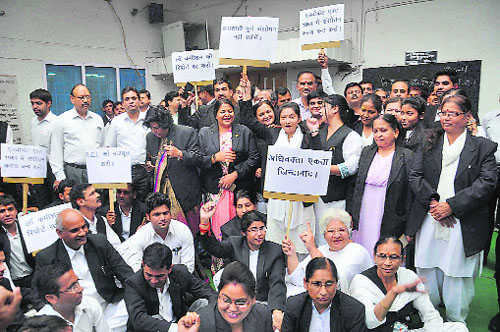Redefining the brief
The Law Commission's 266th report has recommended certain drastic changes in the Advocates’ Act, 1961 and that has not gone down well with the legal fraternity in general.
The report indicts the BCI for not performing its basic functions adequately. As the top regulator of the legal profession, it failed to even keep a count of lawyers. It suggested measures to check frequent strikes by lawyers, re-jigging the disciplinary committees by including non-lawyers, compensating litigants for losses suffered and entry of foreign lawyers. “There is a dire necessity of reviewing the regulatory mechanism of the Advocates’ Act, not only in matters of discipline and misconduct of the advocates, but in other areas as well, keeping in view the wide expanse of the legal profession being involved in almost all areas of life,” the Law Commission said.
Taking note of frequent strikes by lawyers, often due to unrelated issues and for unjustifiable reasons, the Commission suggested they should not resort to strike unless there is a compelling reason and approval has been obtained from the Bar Council concerned for a symbolic one-day strike. It also recommended the setting up of an Advocates’ Grievance Redressal Committee, headed by a Judicial Officer in every district to deal with the day-to-day issues and grievances of advocates.
Emphasising the need to review the regulatory mechanism of the legal profession, it suggested that the BCI must include individuals from outside the legal profession as is the case with Medical Council of India and some other professional bodies. Notably, it recommended changes in the composition of disciplinary committees and favoured the inclusion of retired judges, persons from High Court registry, civil society members, bureaucrats, and legal academicians so as to dilute the majority of lawyers in these committees. “This is necessary to prevent corrupt practices in disciplinary functions in the lawyers' fraternity,” it said.
It also suggested the modification of the definition of “advocate,” under Section 2 of the Act so as to include foreign lawyers. An “advocate” maybe defined as someone who has entered in any roll under the provisions of this Act and includes an advocate carrying on practice in law with a law firm, by whatever name called, and a foreign lawyer registered under any law in a country outside India and recognised by the BCI, it said.
The Commission has also proposed to restrict an advocate who has been elected/nominated as a member of the State Bar Council consecutively for two terms from contesting elections or being nominated for the ensuing next term of the State Bar Council.
According to the proposed Section 9, the Disciplinary Committee constituted by the BCl should include five persons of which “two persons shall be elected by the Council from amongst its members; two persons shall be from amongst eminent persons from fields other than law to be co-opted by the Council; and the fifth member shall be a person nominated by the High Court”.
In case of the BCI, “the fifth member of such Disciplinary Committees shall be nominated from among persons who have been the Chief Justice or a Judge of a High Court”. In case of a State Bar Council, "fifth member shall be a person nominated from among persons who have been a district judge". But it's the Commission's recommendation to set up a Special Public Grievance Redressal Committee by the BCI to inquire into complaints of corrupt practices or misconduct against any office-bearer or BCI member in discharge of his duties that is being resisted the most. Lawyers are opposing it particularly because it wouldn't be an all-lawyer body. It would consist of a former Supreme Court judge or Chief Justice of a High Court as its Chairman; two retired judges of different high courts as its members; one senior advocate; one BCI member. The Law Commission has also proposed that a State Bar Council may remove from the state roll, the name of any advocate who is found guilty of serious misconduct or abstaining from courts work or causing obstruction in court's functioning.
Besides, the Commission has also recommended that a new Section 45A may be inserted after Section 45 of the Advocates Act to compensate any person who has suffered “loss due to the misconduct of the advocate or for his participation in strike or otherwise”.
Such a claim for compensation can be made against the advocate in the appropriate forum established under any law for the time being in force. It is also provided that the non-payment of fees, either in full or part, by a person to his advocate shall not be a defence available for the advocate against whom such claim for compensation is made. The BCI has described the proposed amendments as a hastily prepared Bill which "takes away the freedom of lawyers to act fearlessly in court proceedings" and has demanded its complete withdrawal. However, many in the noble profession do not support trade-union type activism by bar bodies.
Notwithstanding the threat of agitation by the BCI and other bar bodies, much would depend on the stand taken by the government before the Supreme Court. The apex court is likely to consider the Law Commission's report after the summer vacation. But one thing is clear. The manner in which BCI and state bar councils have been functioning so far, change is inevitable. It's only a question of when and how much.
satyastp@gmail.com










